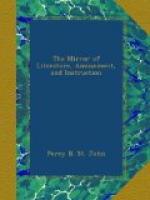“Gives not the hawthorn bush a sweeter
shade
To shepherds, looking
on their silly sheep,
Than does the embroider’d canopy
to kings?”
J.H. Wiffen, dating from the sentimental seclusion of Woburn Abbey, a song replete with all the grace and imagination of his “Ionian Hours.”—Charles Lamb, the “deep-thoughted Elia,” introducing us to the maidenly residence of his cousin Bridget; delighted with delighting; his fancy expatiating on a copious medley of subjects between the stiff Mandarins on the old fashioned china, and that Beaumont and Fletcher, the purchase of his rigid economy, ere his talents had brought him fame and fortune.—Letitia Landon “the English Sappho,” a being existing but in the atmosphere of love and flowers; equally sensitive at the opening of a violet as at the shutting of a rose. But our list of the living is too extended; and we will speak of some of the departed.
Interspersed with the emanations of our existing bards, we have, occasionally, those precious morceaux which have been bequeathed us by the illustrious dead. Trifles, yet how esteemed! Remembrances of Byron, with his fiery impetuosity, spurning the trammels of worldly sorrow; and prescribing death as a panacea for his lamentable despair; yet subduing us with refined regrets, as he was wont, in his changing mood,
“To sun himself in heaven’s pure day.”
Shelley, misanthropically commencing with the turbulence of the chainless sea: a spirit matured to madness by the overawing and supernatural terrors of German romance: as he asserts himself to be, in his lamentation for the author of Endymion, one who
“Had gaz’d on Nature’s
naked loveliness,
Acteon-like, until he fled away.”
John Keates, forsaking the land of his fame, and prematurely resigning his “quiet breath,” on that spot




